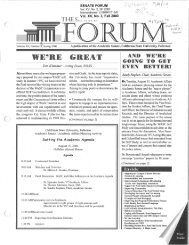VIENNA BOYS CHOIR Wiener Sängerknaben
VIENNA BOYS CHOIR Wiener Sängerknaben
VIENNA BOYS CHOIR Wiener Sängerknaben
You also want an ePaper? Increase the reach of your titles
YUMPU automatically turns print PDFs into web optimized ePapers that Google loves.
Program Notes – page 13<br />
Contemporary Vienna<br />
Der Traum der Armen (The Dream of the Poor) (2001)<br />
Bernhard Philipp Eder (b. 1984)<br />
Text: Karl Simrock (1802 – 1876), after Ulrich von Liechtenstein (1200 – 1275)<br />
Bernhard Philipp Eder was born in Vienna. He discovered his passion for music early on; he studied<br />
piano as a child and attended Vienna's Musikgymnasium. Eder was determined to become a composer;<br />
he took private lessons, and enrolled in the Vienna Conservatory. In 2005, Eder started studying at<br />
Vienna's University for Music;; in 2006, he received first prize at the competition “Salieri today”.<br />
Ulrich von Liechtenstein (1200 – 1275) was a medieval minnesinger and a powerful politician. His<br />
family took its name from their castle near Judenburg in Styria; there is no connection to the<br />
principality of Liechtenstein. His political positions include that of steward or seneschal and later of<br />
marshal and judge of Styria. Ulrich, who owned three castles, wrote a collection of poems called<br />
Frauendienst (Service of the Lady), in which a knight performs great deeds for – married –<br />
noblewomen, relations strictly Platonic in keeping with medieval court rules. The hero, who is called<br />
Ulrich, travels from Venice to Vienna dressed of all possible guises as Venus. Venus competes in<br />
jousts; he breaks 307 lances and defeats all challengers. The Lady however, is not impressed; she asks<br />
for more deeds and even requests a mutilation. Ulrich goes on another quest, this time dressed as King<br />
Arthur. In Brian Helgeland's 2001 movie, A Knight's Tale, the main character, William Thatcher,<br />
played by Heath Ledger, adopts the name of Ulrich von Liechtenstein.<br />
Bernhard Eder uses the first three verses of Karl Simrock's 19th century adaptation of the medieval<br />
text; Ulrich's original has five verses. The poem celebrates the ideal of minne, courtly love, perhaps<br />
not so ideal, as the singer will never “get the girl”. He has to be content with her greeting, from afar.<br />
Text:<br />
In dem Walde süsse Töne<br />
Singen kleine Vögelein;<br />
An der Haide blühen schöne<br />
Blumen in des Maien Schein.<br />
Also blüht mein hoher Mut<br />
Wenn er denkt an ihre Güte,<br />
Die mir reich macht mein Gemüte<br />
Wie der Traum den Armen tut.<br />
Hoffnung hat auf hohe Dinge<br />
Die Erwartung mir gestellt,<br />
Dass mir noch an ihr gelinge,<br />
Süsses Los mir einst noch fällt.<br />
Der Erwartung freu ich mich:<br />
Gebe Gott, dass ichs beende,<br />
Dass sie mir den Wahn nicht wende,<br />
Der mich freut so inniglich.<br />
Program Notes continued on the next page










